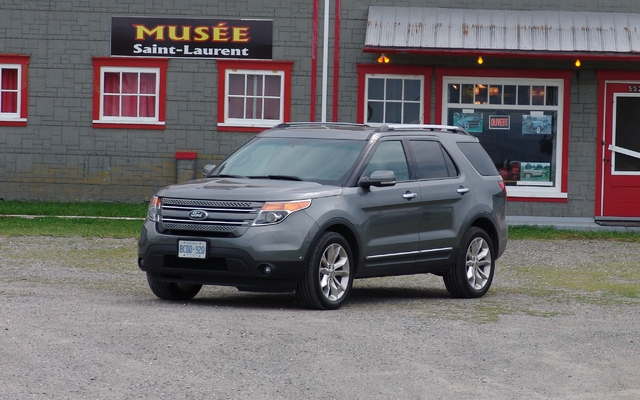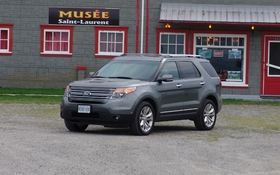2011 Ford Explorer – A well-deserved vacation

| Strong points |
|
|---|---|
| Weak points |
|
When test driving a vehicle, an automobile journalist must check everything: from handling to performance to accessories, not to mention assessing said vehicle’s practicality and personality. Catch an automobile journalist on vacation, however, and you can kiss all that verification and evaluation good-bye!
During my recent vacation, I didn’t evaluate the fully loaded 2011 Explorer Limited 4WD that Ford had loaned me for three weeks with my usual gusto because...I didn’t feel like it. In any case, I had already done it during the launch. Sylvain Raymond and Denis Duquet also assessed it, and Marc Lachapelle already gave us a very relevant account of his trip to Lac St-Jean in an Explorer pulling a trailer. Basically, I used “my” Explorer like any other average person.
Beep, beep, beep...
One of the first things was the frequent beeping of the different detection systems once you put it in reverse. The slightest car that passes the general vicinity when backing up is noticed by the “Reverse Sensing System”. There are two choices: either you waste your time waiting and wondering where the car, the pole, the garbage can or the imaginary bird is, or you deactivate the “reverse sensing system”, as it is basically useless at that point.
The purpose of the “Collision Warning” system is to warn you that a car in front just cut you off or is too close. On a trip to Hampton Beach in New Hampshire, I had to brake quickly to avoid crashing into a car that decided to stop in front of me for no reason. While the collision was becoming more and more probable, the red LED “Collision Warning” lights started to flash and beep. As though I needed to be told that I was in trouble. I’ve often criticized Toyota and Lexus for having overly intrusive systems, and now Ford is doing the same thing. By the way, I avoided the collision, no thanks to the “Collision Warning”.
Stability in the storm
I also had the chance to drive in Québec while Irene was raging, on Sunday, August 27th. The Ford Explorer charmed me with its unfailing stability that is near total immunity to crosswinds. The extra long wipers did a great job on the windshield.
Unreliable GPS…
I liked the GPS a lot less... Rarely have I seen such a poorly made accessory (on option for $700). In addition to the fact that it froze almost every time I wanted to change scale, it’s inconceivably complex to program. In reality, it does what it pleases. For example, one morning, at my hotel in Québec City, I tried to punch in Notre-Dame Street West in Trois-Pistoles (for a visit to the Musée St-Laurent). My GPS kept trying to send me to Notre-Dame West all right, but in Trois-Rivières ! I never did manage to figure out how to program it. Fortunately, I know Québec City well enough that I was able to make my way out without incident. Oh, and if you find a way to enter an address on Chemin des Cyprès in Ste-Séraphine, call me and let me know how... Once I made it to my destination thanks to a good old paper road map, I noticed that there was an error in the GPS – the name of the road in question was spelled “des Cypràs” in the GPS. But even when I tried to reproduce this error in the “Destination” field, it still didn’t work. Basically, don’t get rid of your TomTom, Garmin or road maps just yet!
On the other hand, I was able to plug my Blackberry and iPod into the Sync system without much difficulty. And that’s no small feat because I’m distressingly useless with this sort of gadget. And the MyFord Touch? I didn’t play with its myriad of controls as I didn’t want to spoil the fun of being on vacation...
Hanging around
On my return from Québec City, I noticed an air conduit hanging under the vehicle. After a fast stop at Banlieue Ford in St-Apollinaire where a mechanic who had just finished his shift was kind enough to quickly remove the faulty part, I was able to get back on the road. According to the mechanic, the purpose of this conduit is to bring fresh air into the exhaust system. However, if I didn’t have to tow a trailer, the absence of this part wouldn’t have caused any damage. Thanks to the mechanic for the unpaid overtime.
Long trip? No problem!
Even during long periods at the wheel (or as a passenger), I never felt fatigued. The seats, like the suspensions, are very comfortable, the passenger compartment is as silent as a vault, the footrest is sufficiently large and well placed, the chassis turns out to be very solid and the absence of untimely body noises help make the Explorer more fun to drive. This is no sports car, but if that’s what you’re looking for, Ford makes the Mustang...
Conveniences
The power trunk closing assist came in particularly handy during my vacation, especially since we took advantage of some rainy days to make a lot of small and large purchases. Another of life’s gifts: the electric power seats in the third row. You’ll quickly get used this these little treats (on option for $900, and including heated and ventilated front seats, the very pleasant Sony audio system and satellite radio)...
How to save $5,350
I never once used the sunroof ($1,750), the “Auto Park” feature that helps the vehicle parallel park all by itself (which is part of the Technology Package, that I could have done without...for $2,400), or the class III trailer hitch receiver ($500). What’s more, I found the $700 GPS system completely useless, and I never used the knob located on the console for off-road driving either.
Let’s talk fuel consumption
For three weeks, I travelled 3,631 km and the 3.5-litre 290-hp V6 burned 455 litres of regular gasoline for a total of $546.55. The average fuel consumption was 11.8 L/100 km according to the onboard computer, but 12.5 if I trust my scientific calculations... According to Ford, this vehicle should have done 8.8 litres on the highway and 12.5 in town.
Regardless, the fuel consumption that I obtained was decent but not exceptional considering the Explorer’s very heavy weight (2,146 kilos). You should also note that 90% of the I covered were on backroads or highways, where I drove at slightly illegal speeds. It’s interesting to note that barely ten years ago, a 290 horsepower engine lugging around more than 2,000 kilos would have easily guzzled more than 15 L/100 km!
Notwithstanding the numerous useless (for me) options that increased the price of my Explorer to $51,779 before transport and preparation costs and the inescapable taxes, my test drive was a lot more positive than negative. It was with a heavy heart that I returned the keys after my vacation. And now I have the proof that the technology is fantastic...when the manufacturer doesn’t abuse it and the user knows what to do!











